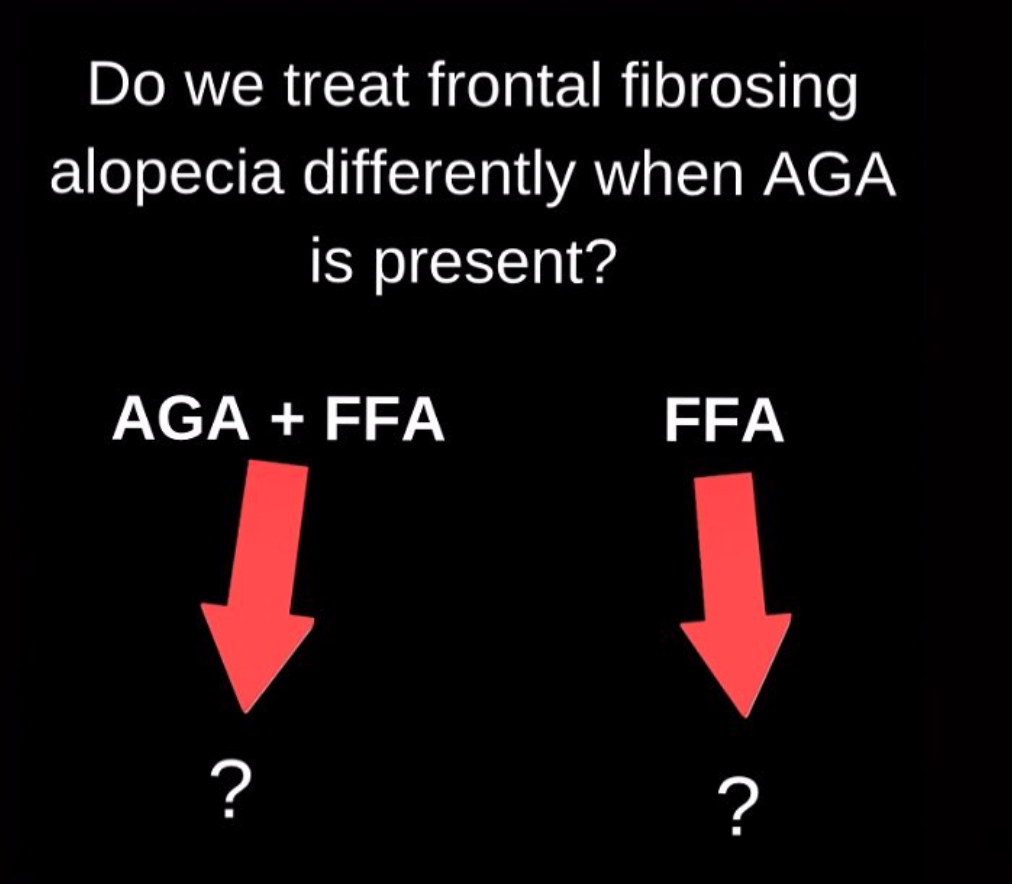Acitretin, Isotretinoin and Minoxidil for Patient with FFA & AGA: What if they cause shedding?
Retinoids for Patient with FFA & AGA: Do they cause hair shedding that worsens hair loss?
I’ve selected this question below for this week’s question of the week. It allows us to discuss the use of retinoids and minoxidil in FFA .
QUESTION
I am a female age 67. My diagnosis is frontal fibrosing alopecia (FFA) - with a new diagnosis of underlying androgenetic hair loss (AGA). My dermatologist originally planned to put me on Acetrin for FFA but she now says that the shedding usually caused by retinoids will in cases with underlying AGA not be temporary, but will precipitate permanent hair loss, and therefore she does not want to prescribe it.
For review, I have itching all over scalp at different times [behind ears; frontal hairline, crown, temples]. Rosacea [onset only after topical clobetasol ]; thinning all over scalp with exception of crown; hair already thinning at age 50; eyebrow thinning at age 35/40. medicated since April 2020 by first Betnovate, then Dermovate [Clobetasol], then topical Pimecrolimus with Lymecyline. Other medications: HRT [estrogen only], statins [Rosuvastatin], ARB [Candesartan, as the only BP medication that is not linked to alopecia]; in the past decades [but now discontinued because of links to alopecia]: sun blockers and retinol creams.
I do not understand why underlying AGA should make a difference in prescribing this medication. However, I am concerned about hair follicles affected by FFA. I worry that the hair near my hairline, once shed, will not grow back because in FFA, the follicles that still produce hair may not generate new hair after the shedding, as more and more follicles become affected by FFA. I don't know if hair follicles, once affected by FFA, (but not yet dead) continue their cycle from catagen to anagen until such time when they are truly dead.
I have the same concern with Minoxidil, in particular as it was confirmed by another hair clinic that they do not advise the use of Minoxidil in patients with FFA, as Minoxidil stimulates initial shedding and FFA affected follicles would not produce new hair after that. - I would be very grateful if you could give me your opinion on the use of Minoxidil and Acetrin in a case of FFA with AGA.
Many thanks for your help and kind regards
ANSWER
Thanks for the great question. There is a lot to discuss, so let’s get to it.
First, let me say how relevant this question is. A very large proportion of women over 50 years of age with a diagnosis of FFA have a diagnosis of AGA in my opinion. I’d put the number around 55 % to even as high as 70%. So the most common scenario is treating both. Do I worry that any of my treatments are going to worsen the AGA? Not all that much. Is it possible? Sure. Do I see it? Yes, but I’d say less than 1 in 150 women. This is my experience in treating large numbers of patients with FFA.
POINT 1. The Question is Important Because Retinoids are among the Most Effective Treatments for FFA
Retinoids like isotretinoin and acitretin are among the most effective treatments for FFA. They are what I called “gold medal” treatments or first line treatments. Retinoids together with 5 alpha reductase inhibitor drugs are the most effective treatments for FFA. There is still a bit of debate about which drugs are actually better in treatment FFA. A 2017 study by Rakowska and colleagues suggested retinoids are the clear winner. Other studies by Vañó-Galván and colleagues suggested that finasteride and dutasteride (especially dutasteride) are the top treatments.
Here are the treatments that I consider top treatments:
POINT 2. Acitretin and Isotretinoin Can not be Used with Lymecycline
I’m not sure from your story if you are still on Lymecycline or not. It’s important to be aware that these two drugs can’t be used together - ever. So that’s not an option. But if you are off lymecycline, acitretin could be an option provided your cholesterol is under good control with the statin. If you are still on lymecycline and feel that it’s helping, you might decide to continue it and look to other options like dutasteride, finasteride or hydroxychloroquine. Acitretin won’t be possible. These are all discussions that you would want to have with your dermatologist. For some patients with FFA, they are good options - but not everyone.
POINT 3. Shedding can occur with Acitretin but is Not Common on Small Doses used in FFA.
Let’s come back to acitretin. Acitretin can cause shedding in 3 -5 % of users at the typical doses used in treating various diseases. The issue is that in FFA, I normally use much smaller doses - like 10 mg daily or even every other day to start. The risk of shedding is a lot less than 3-5 %. Do we have a number to quote you? Not really but I’d estimate it’s around 1 % and probably less.
How do I know? Well I have a large number of patients with FFA and AGA with on retinoids and I am not answering emails and phone calls very often about shedding issues. It still happens.
Provided you are not on Lymecycline, you certainly could consider going slowly on the dose if that issue something you want to discuss with your dermatologist again.
There are other options too - especially dutasteride (and finasteride). If your dermatologist is worried about shedding and won’t use, then dutasteride is an option. Do these drugs cause shedding? Sure, sometimes. Anything can. Fortunately, it is just not common either. shedding is less likely with dutasteride than acitretin but fortunately both are fairly uncommon. Sometimes, I prescribe acitretin and dutasteride together.
So, to summarize. It’s not impossible to have shedding from acitretin. It’s just not so common at the doses we use in FFA.
POINT 4: If shedding does occur, shed hair is not necessary gone forever.
There is an assumption that is wrong here - and that is that any shed hair is guaranteed to be gone forever. That’s just simply not accurate. You are shedding hairs all the time - and some are going to pop back up through the scalp. The more active the FFA is the less likely the hair is to come back up - but a lot still does even in active FFA. If the FFA is only mildly active - then probably a good deal of the hairs are going to return.
Granted, you are correct that we don’t want shedding if we don’t have do.
But if shedding is going to occur it will be mild most likely and happen around 6-8 weeks after treatment . You’ll have a few week window to stop. So I said that shedding is not common with 10 mg acitretin and I’ll point out that even if shedding does occur, it’s usually not common to massive shedding. So we have two “not commons’ in a row.
The risk of massive chaos with the hair is low.
Is it zero? Well no. But it is low.
Do be sure to review with your dermatologist the role of dutasteride too. Now, you might have contraindications to the drug so that is something you’d need to review with your doctors. I don’t have enough information. But often in situations like this I might consider starting dutasteride 0.5 mg 3 times weekly with acitretin or isotretinoin 10 mg three times weekly (along with steroid injections and topical pimecrolimus) and see where things are at in 4 months. We can go up on dutasteride dosing or up on acitretin dosing. That’s often my plan in situations like this but it may or may not apply to your situation.
POINT 5. Minoxidil is a common treatment for FFA.
Minoxidil can cause shedding. Sure. Is there a big risk that if you get shedding, the hair is not coming back? No. Is there a small chance it’s not coming back? Sure, but it’s small.
Minoxidil can be an important part of managing FFA sometimes. It can also play a key role in helping androgenetic alopecia.
Many of my dermatology colleagues who treat FFA like I do also use minoxidil. It’s not off the table as a treatment. I consider it a silver medal treatment - meaning that I might not start it right away in everyone but I often add it down the road. Some hair specialists use minoxidil immediately in treating FFA. I don’t but some do. I use it as an “add on” in many patients.
Conclusion and Summary
Thanks again for the question. I hope this helps. Minoxidil is commonly used in treating FFA and even in those who have AGA. Is it a first treatment to reach for? Not in my opinion but it’s a good option for many once things are coming a bit more stable. Minoxidil is worked into many patient’s treatment plans for FFA - even if they have AGA.
The acitretin is a good option for many (provided you are not still on Lymecycline or any sort of tetracycline antibiotic). In my opinion there are three treatments that a really need to be discussed for anyone with FFA - the retinoids (acitretin, isotretinoin), the 5 alpha reductase inhibitors (dutasteride or finasteride) and steroid injections. Those discussions are worth having with the dermatologist.
I’m not sure exactly why the other clinic you went to did not want you to use minoxidil. You can read my previous article on “The Six Reasons Why My Practitioner Won’t Start the Treatment You Were Hoping” - the answer certainly lies in one or more of these 6 reasons.
Thank you again



